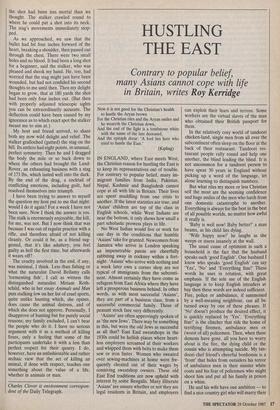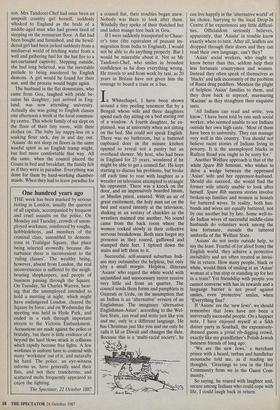HUSTLING THE EAST
Contrary to popular belief,
Now it is not good for the Christian's health to hustle the Aryan brown For the Christian riles and the Aryan smiles and he weareth the Christian down, And the end of the fight is a tombstone white with the name of the late deceased, And the epitaph drear: 'A fool lies here who tried to hustle the East.' (Kipling)
IN ENGLAND, where East meets West, the Christian reason for hustling the East is to keep its representatives out of trouble. For contrary to popular belief, many im- migrant families from India, Pakistan, Nepal, Kashmir and Bangladesh cannot cope at all with life in Britain. Their lives are spent muddling from one crisis to another. If the latest statistics are true, and `Asian' children are top of the class in English schools, while West Indians are near the bottom, it only shows how small a part scholastic prowess plays in life.
No West Indian would live or work for one day in the conditions that humble `Asians' take for granted. Newcomers from Jamaica who arrive in London speaking an impenetrable patois are cheerfully rabbiting away in cockney within a fort- night. 'Asians' who arrive with nothing and a week later own a corner shop are not typical of immigrants from the subconti- nent. Almost certainly they have come as refugees from East Africa where they have left a prosperous business behind. In other words, as with most successful 'Asians', they are part of a business class, from a successful commercial family. Those of peasant stock fare very differently.
`Asians' are often approvingly spoken of as 'the new Jews'. There may be something in this, but were the old Jews as successful as all that? East End sweatshops in the 1930s could be hellish places where heart- less employers screamed at their workers and whipped them with belts to make them sew or iron faster. Women who sweated over sewing-machines at home were fre- quently cheated out of their wages by conniving sweatshop owners. These old East End traditions are now upheld with interest by some Bengalis. Many illiterate `Asians' are unsure whether or not they are legal residents in Britain, and employers can exploit their fears and terrors. Some workers are the virtual slaves of the man who obtained their British passport for them.
In the relatively cosy world of tandoori chicken-land, single men from all over the subcontinent often sleep on the floor at the back of their restaurant. Tandoori res- taurant people rally round and help one another, the blind leading the blind. It is not uncommon for a tandoori person to have spent 30 years in England without picking up a word of the language, let alone learning to distinguish numbers.
But what riles my more or less Christian self the most are the seeming confidence and huge smiles of the men who lurch from one domestic catastrophe to another. Everything is always for the best in the best of all possible worlds, no matter how awful it really is.
`Baby is well now! Baby better!' a man beams, as his child lies dying.
`Wife happy now!' he laughs as she weeps or stares insanely at the wall.
The usual cause of optimism in such a household is the fact that the husband speaks such 'good English'. One husband I know who speaks 'good English' can say `Yes', 'No' and 'Everything fine!' These words he uses in rotation, with great emphasis. If the sole use of the English language is to keep English intruders at bay then these words are indeed sufficient. Fire, police or ambulance, if summoned by a well-meaning neighbour, can all be turned away by one of these phrases. If `No' doesn't produce the desired effect, it is quickly replaced by 'Yes'. 'Everything fine!' is the clincher that rids the home of terrifying firemen, ambulance men or (worst of all) policemen. Then, when these demons have gone, all you have to worry about is the fire, the dying child or the cousin who is attempting suicide. My tan- doori chef friend's cheerful bonhomie is a `front' that hides from outsiders his terror of ambulance men in their sinister white coats and his fear of policemen who might shoot him and put all his family in prison on a whim.
He and his wife have one ambition — to find a nice country girl who will marry their son. Mrs Tandoori-Chef had once been an unspoilt country girl herself, suddenly whisked to England as the bride of a middle-aged man who had grown tired of sleeping on the restaurant floor. A flat had been bought and furnished, and the bewil- dered girl had been jerked suddenly from a mediaeval world of fetching water from a well and gathering fuel for the but fire to a net-curtained captivity. Stepping outside, she had long believed, was the inevitable prelude to being murdered by English demons. A girl would be found for their son, and the process would begin again.
The husband in the flat downstairs, who came from Goa, laughed with pride be- cause his daughter, just arrived in Eng- land, was now attending university. Actually she was going to English classes one afternoon a week at the local commun- ity centre. This whole family of six slept on the floor of their tiny room, with their clothes on. The baby lay nappy-less on a soaking flour sack, day in and day out. `Asians' do not sleep on floors in the same woeful spirit as an English tramp might, but feel more comfortable that way. All the same, when the council placed the Goans in bed and breakfast, the family felt as if they were in paradise. Everything was done for them by hard-working chamber- maids. When they had to leave paradise for a council flat, their troubles began anew. Nobody was there to look after them. Wistfully they spoke of their thatched but and laden mango tree back in Goa.
If I were suddenly transported to Chauc- er's time (the equivalent of peasant im- migration from India to England), I would not be able to do anything properly. But I would be miserable about it. Not so Mr Tandoori-Chef, who smiles in broadest confidence as he does everything wrong. He travels to and from work by taxi, as 20 years in Britain have not given him the courage to board a train or a bus.
In Whitechapel, I have been shown around a tiny peeling tenement flat by a Bengali whose wife and three daughters spend each day sitting on a bed staring out of a window. A fourth daughter, he ex- plained, was at university when not sitting on the bed. She could not speak English. There was no bathroom, but a battered cupboard door in the minute kitchen opened to reveal not a pantry but an overhead shower. My host, who had been in England for 25 years, wondered if he might be able to get a council flat. He kept starting to discuss his problems, but broke off each time to roar with laughter as a wrestler on television attempted to strangle his opponent. There was a knock on the door, and an impressively bearded Imam, or Muslim priest, entered. With an air of great excitement, the holy man sat on the bed and stared intently at the television, shaking in an ecstasy of chuckles as the wrestlers maimed one another. No sound came from the back room where the women rocked slowly in their collective nervous breakdowns. Both men forgot my presence as they roared, guffawed and stamped their feet. I tiptoed down the stairs and left them to it.
Successful, self-assured suburban Indi- ans may outnumber the helpless, but only bby a small margin. Helpless, illiterate `Asians' who regard the white world with unjustified and unnecessary terror receive very little aid from an quarter. The council sends them forms and pamphlets in Gujerati or Urdu, on the assumption that an Indian is an 'alternative' version of an Englishman. The imaginary 'alternative Englishman-Asian', according to the Wel- fare State, can read and write just like you and me, only in a different language. He has Christmas just like you and me only he calls it Id or Diwali and changes the date. Because this is a 'multi-racial society', he can live happily in the `alternative world' of his choice, hurrying to the local Drop-In Centre if he experiences any little difficul- ties. Officialdom seriously believes, apparently, that 'Asians' in trouble know exactly where to turn. After all, leaflets are dropped through their doors and they can read their own language, can't they?
`Asian' social workers, who ought to know better than this, seldom help their less fortunate countrymen and women. Instead they often speak of themselves as `blacks' and talk incessantly of the problem of Rasta drug peddlers. Mention the plight of helpless 'Asian' families to them, and they draw back in reproof, murmuring `Racism' as they straighten their exquisite saris.
`All Indians can read and write, you know,' I have been told by one such social worker, who seemed unable to see Indians outside her own high caste. 'Most of them have been to university. They can manage very well in this country. You should not believe racist stories of Indians living in poverty. It is the unemployed blacks in Railton Road you ought to be sorry for.'
Another Welfare approach is that of the white Spare Rib feminist, who wishes to drive a wedge between the oppressed `Asian' wife and her oppressor-husband. Should she succeed, she would find the former wife utterly unable to look after herself. Spare Rib success stories involve broken-up families and women in hostels for battered wives. In reality, both hus- bands and wives are equally battered, not by one another but by fate. Some well-to- do Indian wives of successful middle-class husbands do voluntary work among the less fortunate, outside the tattered umbrella of the Welfare State.
`Asians' do not invite outside help, to say the least. Fearful of (or aloof from) the English world, they achieve a protective invisibility and are often treated as invisi- ble in return. How many people, black or white, would think of smiling at an 'Asian' woman at a bus stop or standing up for her in a train? Yet friendship with people you cannot converse with has its rewards and a language barrier is not proof against smiles, even 'protective' smiles, when `Everything fine!'
If 'Asians' are the 'new Jews', we should remember that Jews have not been a universally successful people. On a happier note, I have enjoyed myself at a Sikh dinner party in Southall, the expensively- dressed guests a jovial rib-digging crowd, exactly like my grandfather's Polish-Jewish business friends of long ago.
`We are the new Jews,' a merchant prince with a beard, turban and handlebar moustache told me, as if reading my thoughts. 'Greetings to you in the Host Community from we in the Guest Com- munity.'
So saying, he roared with laughter and, secure among Indians who could cope with life, I could laugh back in return.



















































 Previous page
Previous page